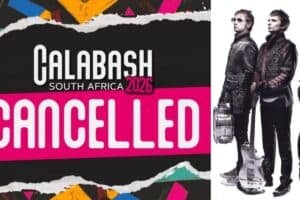A collective of festivals, including the Joy of Jazz and Suidoosterfees, expressed concern over McKenzie’s statement.

Following Sport, Arts and Culture Minister Gayton McKenzie’s calls for a probe into festival funding, some of the country’s biggest festivals have come together demanding more clarity from him.
A collective of South African arts festivals, which includes the Joy of Jazz and Suidoosterfees, has expressed concern over recent public statements by McKenzie regarding funding for festivals.
“We are not seeking confrontation, we wish to set the record straight and engage constructively with government about the future of our sector, particularly after receiving neither funding nor clarity about funding over the past year,” chairperson of the National Arts Festival Board Professor Siphiwo Mahala said in the statement.
In a statement made about two weeks ago, McKenzie stated that there was a sense of entitlement among art festivals regarding funding.
“The department has found itself in relationships with festivals and their organisers where the expectation of funding has become a form of entitlement, despite numerous other promoters looking to fund new and innovative festival concepts,” said McKenzie at the time.
In response, Mahala said the collective’s call for engagement with the minister and the department aims to clarify policy, rebuild trust, and ensure that the needs of artists and the communities benefiting from the economic impact of events are addressed in current and future budget cycles.
“We have sent a letter to the minister requesting such engagement, and we await his timely response,” he said.
ALSO READ: Gayton McKenzie calls for probe into festival funding, says it’s become ‘a form of entitlement’
Festivals during Covid pandemic
In his statement, the minister specifically mentioned the Cape Town International Jazz Festival as one of the music gatherings that benefited from governmental funding in 2020.
“The most obvious case is that of the Cape Town International Jazz festival, which was given R3 million during the 2019-20 financial year,” said McKenzie.
The festival was cancelled due to the Covid-19 pandemic, which led to lockdown restrictions that prevented any public gatherings.
“The facts in my possession indicate that no portion of the funding was returned to the department despite numerous costs not needing to be incurred.”
“What were the circumstances around this being acceded to? I would also like to know how many other festivals were funded in this manner without an event taking place.”
The statement from the collective said art festivals played a vital role during Covid-19, pivoting to online events, in-home residencies, webinars and workshops, ensuring that artists and audiences remained connected and that artists were able to earn some income during a financially devastating period.
The Cape Town International Jazz Festival is not part of the collective of festivals that require clarity from McKenzie.
Festivals that are part of the collective include Aardklop, Cape Carnival, Klein Karoo Nasionale Kunstefees (KKNK), the National Arts Festival, Vrystaat Kunstefees, and Woordfees.
ALSO READ: Joy of Jazz: Through the eyes of three artists who’ve performed at its three venues
Festival bringing people together
KKNK chairperson Christo van der Rheede recalled when former President Nelson Mandela visited their festival in 2001, where he highlighted the ability of festivals to bring people together.
“Given that Minister Gayton McKenzie shares the same vision as President Mandela, we must now put that into practice,” said Van der Rheede.
“This means investment in festivals, which will yield rewards for the country and its people every year, and will make a significant contribution to the vision of a united South Africa.”
The collective’s statement stated that all public funding received is subject to rigorous reporting, with tranches released only after submission of satisfactory documentation, including annual financial statements.
“All of these reports are in the possession of the Department of Sport, Arts and Culture,” noted the statement.
“The economic and cultural impact of festivals is significant.”
According to the festivals, in 2024/25, four major arts festivals alone presented 761 works across 2380 performances, directly employing more than 6000 artists and paying more than R34 million in fees.
“Many of these works went on to tour other festivals and theatres, providing more jobs and opportunities,” the statement said.
CEO of Nasionale Afrikaanse Teater-inisiatief (NATi) Cornelia Faasen emphasised the importance of government support for the arts.
“National policy and funding remain essential for sustaining the sector, supporting livelihoods and enabling innovation and cultural exchange across the country,” she said.
The Department of Sport, Arts and Culture has acknowledged the letter sent by the collective; however, the collective has not received an invitation to meet or speak with the minister.






